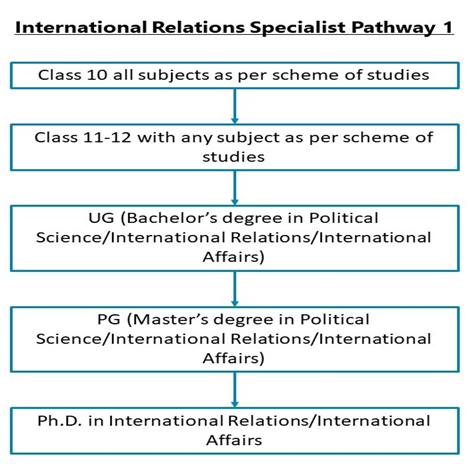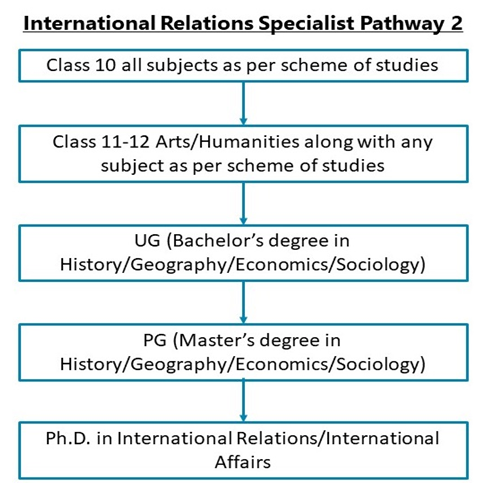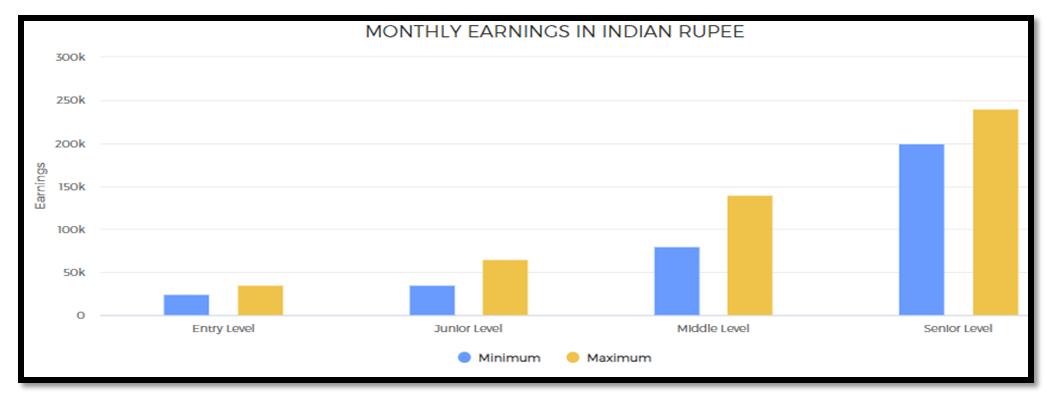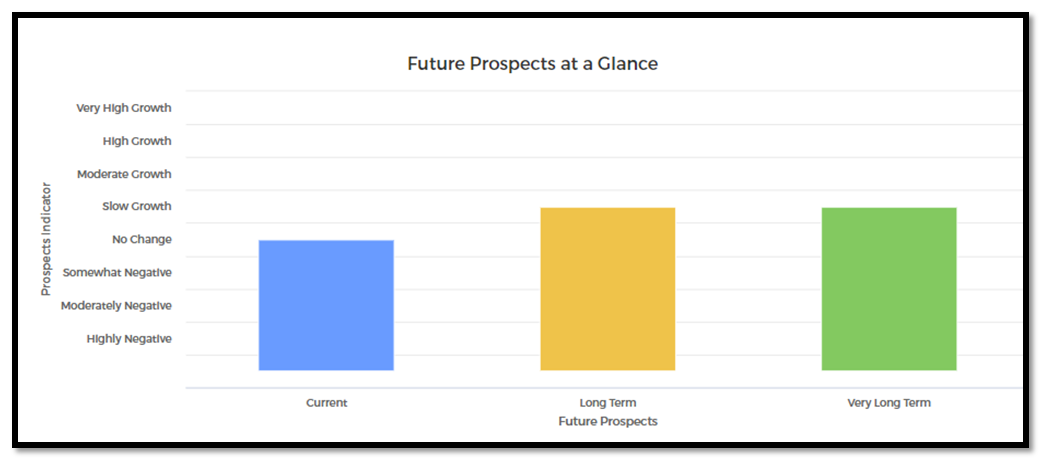International Relations Specialist
Entry Level Qualification
Graduate
Career Fields
Humanities, Liberals Arts & Social Science
For Specially Abled







 ,
,
About Career
1. As an International Relations Specialist, your primary job responsibility will be to study the relationships among sovereign nations of the world, analyze how foreign policies of other nations affect your country’s national / foreign policies, and offer actionable advices to your employer / organization that is in sync with the international laws, labor activities, economic policies, and programs.
2. Your area of expertise will revolve around one or more areas of international relations, such as international trade, international finances, foreign policy, domestic security, sustainable development, human rights, military policies, and other world affairs including politics, economics, language and culture, history, and geography.
Key Roles & Responsibilities:
1. Analyzing and interpreting foreign laws and policies.
2. Offering professional advice to employers regarding foreign policies.
3. Identifying and analyzing key trends, policies, and strategies in relation to the global scenario.
4. Collaborating with international institutions/organizations and foreign counterparts.
5. Collaborating with government officials, international organizations, and the public media.
6. Developing and evaluating issues/initiatives/programs by carefully studying international policy and standards, overseas developments, and reports.
7. Formulating policies or other necessary recommendations on assigned projects.
8. Conducting in-depth analyses of assigned issues at the national, regional, and global levels and prepare relevant reports.
9. Developing strategies to improve program effectiveness in line with the proposed regulations, legislation or resources.
10. Creating and delivering presentations for assigned research projects.
11. Researching, identifying, and creating policy recommendations for reports.
12. Providing befitting statements before the media on foreign policies and activities.
PARTICULARS | DESCRIPTION |
Name | International Relations Specialist |
Purpose | Analyze and Manage Relationships Between Countries |
Career Field | Humanities, Liberals Arts & Social Science |
Required Entrance Exam | GRE, TOEFL |
Average Salary | 300000 - 1800000 Rs. Per Year |
Companies For You | Government agencies, international organizations & Many More |
Who is Eligible | Graduate |
Career Entry Pathway
Class 10 all subjects as per scheme of studies - Class 11-12 with any subject as per scheme of studies - UG (Bachelor’s degree in Political Science/International Relations/International Affairs) - PG (Master’s degree in Political Science/International Relations/International Affairs) - Ph.D. in International Relations/International Affairs.

After completing your Class 10 all subjects as per scheme of studies, you can complete Class 11-12 with any subject as per scheme of studies. Then, you can pursue your graduation with a Bachelor’s degree in Political Science/International Relations/International Affairs, followed by a Master’s degree in the same specializations. For further studies, you can opt for a Ph.D. in International Relations/International Affairs.
Class 10 all subjects as per scheme of studies - Class 11-12 Arts/Humanities along with any subject as per scheme of studies - UG (Bachelor’s degree in History/Geography/Economics/Sociology) - PG (Master’s degree in History/Geography/Economics/Sociology) - Ph.D. in International Relations/International Affairs

After completing your Class 10 all subjects as per scheme of studies, you can complete Class 11-12 Arts/Humanities along with any subject as per scheme of studies. Then, you can pursue your graduation with a Bachelor’s degree in History/Geography/Economics/Sociology, followed by a Master’s degree in the same specializations. For further studies, you can opt for a PhD in International Relations/International Affairs.
Required Qualification & Competencies
Undergraduate Studies After School:
To build a successful career in International Relations, you must complete your graduation either in Political Science / History / Geography / Economics / Sociology or in International Relations/International Affairs.
Post Graduate studies:
If you wish to bag senior-level job positions in this field, it is essential that you complete your postgraduation level studies in disciplines like Political Science / History / Geography/ Economics / Sociology or you could opt for International Relations/International Affairs.
Doctoral Studies:
If you wish to study further in this field, you could choose to do a Ph.D. in International Relations / International Affairs.
MINIMUM EDUCATION REQUIRED | MAXIMUM EDUCATION REQUIRED |
Post Graduate Postgraduate Degree / Diploma / Certificate Programs for which the minimum eligibility is a pass in Graduation / equivalent Diploma program like Honours Diploma or Graduate Diploma. | Post-Doctoral Post Ph.D. programs for which the minimum eligibility is a Doctoral degree. |

Competencies Required
1. Enterprising - You should have interests for Enterprising Occupations. Enterprising occupations involve taking initiatives, initiating actions, and planning to achieve goals, often business goals. These involve gathering resources and leading people to get things done. These require decision making, risk-taking, and action orientation.
2. Social - You should have interests for Social Occupations. Social occupations involve helping or assisting others; these involve working with and communicating with people to provide various services; these may involve educating and advising others.
Personality traits:
1. You are always or mostly helpful to others.
2. You are always calm or generally remain calm in most situations.
3. You can always act independently or could do so in most situations.
4. You are always or mostly disciplined in your action and behavior.
5.You are always or mostly organized in your day-to-day life and activities.
6. You always prefer to experience new things and have new experiences or you mostly do.
Skills:
1. Active Listening: Giving full attention to what other people are saying, understanding the points being made by others, asking questions, etc.
2. Reading Comprehension: Skills in understanding written sentences and paragraphs in work related documents.
3. Critical Thinking: Skills in the analysis of complex situations, using logic and reasoning to understand the situations and take appropriate actions or make interpretations and inferences.
4. Public Speaking: Talking effectively to a large group of people or an audience or addressing the public at large in different settings such as conferences, seminars, meetings, etc.
5. Negotiation: Skills in bringing others together and trying to reconcile differences.
6. Coordination: Skills in working together with other people to get things done.
7. Time Management: Skills in prioritizing work, managing time effectively.
Knowledge:
1. Communications and Media: Knowledge of how different media such as print, television, radio, and social media works; how to produce content such as news, articles, audio-visual programs, etc. for different media. This includes various ways to inform and entertain people via print, audio, audio-visual and online media.
2. English Language: Knowledge about English grammar, words, spelling, sentence construction, using English to communicate with others, reading in English, etc.
3. Politics & Governance: Knowledge about different political ideologies, political systems,and processes, governance standards and processes, constitutions, etc.
4. Sociology: Knowledge of how humans behave in groups, how societies form, social norms, human relationships, social interactions, cultures, and societal trends.
5. Administration: Knowledge of various administrative and operational functions in managing a business or an organization such as general administration, facility management, front office management, back office management, etc.
Career - Job Opportunities & Profiles
As an International Relations Specialist in India, you’ll find that most of the employment opportunities in this sector lie in Academia (Universities), Research Foundations involved in studying Social Sciences, and NGOs. However, you can also find some job opportunities in various government and security agencies and also in foreign embassies/foreign services.
Work Environment
Essentially, you’ll be working within an office environment. Your work schedule will be quite hectic and stressful. Frequent meetings, conferences, conventions, etc., will be a part and parcel of your work life. Although your daily working hours will be around 9-10 hours, you may often have to work extra hours to meet deadlines. Also, you will have to travel a lot.
Specialisation Tracks In This Career
1. International Affair Specialist (Diplomacy)
As an International Affair Specialist in Diplomacy, you’ll be responsible for representing your nation before foreign countries and protect your nation's interests (economy, politics, trade affairs, etc.) on foreign soil. You will also discuss, negotiate, and mediate with the local government on issues about peace and security, trade and commerce, finance and economics, and also various social and cultural aspects.
2. International Affair Specialist (Governance and Regulations)
These professionals specialize in international governance theories, international laws and regulations, diplomacy, and various other issues concerning international relations (for instance, world history, the role of international law in global governance, etc.).
3. International Affair Specialist (International Policies)
The core area of focus for these professionals is International Policies. They carry out all kinds of strategic, policy-related activities concerning international laws, regulations, programs, and policies. They also assist justice institutions in drafting policies related to matters of internal conflict and other sensitive issues like gender discrimination, etc.
4. International Affair Specialist (Security, Peace, and Conflict)
These professionals are expert intelligence analysts whose prime responsibility is to monitor and keep track of global events, global politics, decisions of foreign leaders, the military status of various nations, and so on. They usually operate on three levels: strategic intelligence, tactical intelligence, and counterintelligence.
5. Regional Specialist
As the name suggests, Regional Specialists are expert intelligence officers who specialize in a particular nation/region. They spend a significant portion of their lives to study a particular nation/region. It is their duty to decode any and every move of that nation/region and provide valuable intel to their employer/organization.
Career Growth
1. There’s pretty much a straight line growth in the field of International Relations. For instance, after obtaining a Master’s degree in any of the above-mentioned specializations, you can begin your career in this field as a Research Associate. While studying Ph.D. in International Relations., you start off as a Junior Research Fellow and then upgrade to Senior Research Fellow. After obtaining your postdoctoral degree, you can become an Assistant Professor and then after 8-10 years, you can become a Professor.
2. If you have a postdoctoral degree, you can join government and security agencies as a Specialist, (for instance, Regional Specialist). Again, in Research Foundations, you begin your career as a Junior Research Associate and after about 8-10 years, you can get promoted to Senior Research Associate. Also, with your doctoral/postdoctoral degrees, you can begin your career as a Junior Scientist/Analyst/Associate, then upgrade to the level of Senior Scientist/Analyst/Associate, and then finally, you get promoted to Chief/Principal Scientist.
Salary Offered
1. The salaries of International Relations Specialists essentially depends on their job profile. For instance, the average monthly salary of an Indian Diplomat is around Rs. 90,000 - 2,20,000 if she/he is working in the country itself. However, the salary can scale up to Rs. 2,40,000, is she/he is posted in foreign countries like UK, USA, etc. There are various other perks too in foreign postings along with free accommodation, car, etc.
2. The average monthly salary of an International Security or Defence Analyst ranges anywhere between Rs. 45,000 - 1,00,000 or more per month. The average monthly salary of an Intelligence Analyst working for government/security agencies can range anywhere between Rs. 90,000 - 120,000 per month or even more.

Monthly Earnings In Indian Rupee
Entry Level | Junior Level | Mid Level | Senior Level | ||||
Min Earning | Max Earning | Min Earning | Max Earning | Min Earning | Max Earning | Min Earning | Max Earning |
25000 | 177500 | 80000 | 190000 | 100000 | 200000 | 180000 | 250000 |
1. Entry level: 0 - 2 years of work experience
2. Junior Level: From 1 to 12 years of work experience
3. Mid Level: From 5 to 20+ years of work experience
4. Senior Level: From 10 to 25+ years of work experience (there could be exceptions in some high-end technical, financial, engineering, creative, management, sports, and other careers; also in the near future, people will reach these levels much faster in many careers and in some careers, these levels will have no meaning as those careers will be completely tech skill driven such as even now, there is almost no level in a Cyber Security Expert’s job)
Work Activities
1. Creative thinking: Developing new ideas, concepts, innovative solutions to problems, newer ways of getting things done, designing products and services, creating work of art and craft, etc.
2. Getting Information and learning: Observing, hearing, reading, using computers, or otherwise obtaining information and learning from it.
3. Communicating with co-workers and others: Communicating with people in writing, verbally or otherwise inside your workplace and various other people who have professional relationships with your place of work including vendors, government officials, etc. or with people at large.
4. Developing and maintaining inter-personal relationships: Developing professional relationships with co-workers and others outside organizations and maintaining good relationships.
5. Decision making and problem-solving: Analysis of data and information; evaluation of alternative decisions and results of decisions; taking the right decisions and solving problems.
6. Organizing, planning and prioritizing tasks: Planning and organizing tasks in order to achieve work goals; prioritizing tasks to achieve goals and making the best use of the time available.
7. Scheduling tasks: Scheduling project timelines, tasks and activities.
8. Strategic planning: Developing visions and goals, developing strategies and action plans for achieving visions and goals.
9. Translating and interpreting: Translating or interpreting information for other people who are written or spoken in languages that other people do not understand.
Future Prospects
Nowadays, nations across the globe are coming forth to both create and strengthen bonds with foreign nations. This is becoming increasingly important for international trade and economics. And as a result, career prospects in the field of International Relations are also fast-emerging.

Future Prospects At A Glance
Current (0-1 year) | Long Term (2-5 year) | Very Long Term (6-10 years) |
No Change | Slow Growth | Slow Growth |


